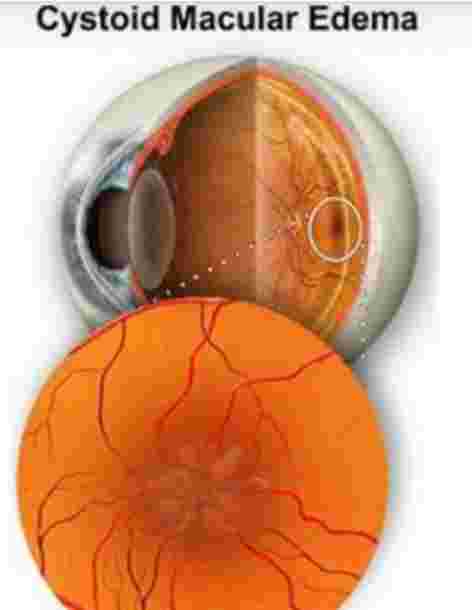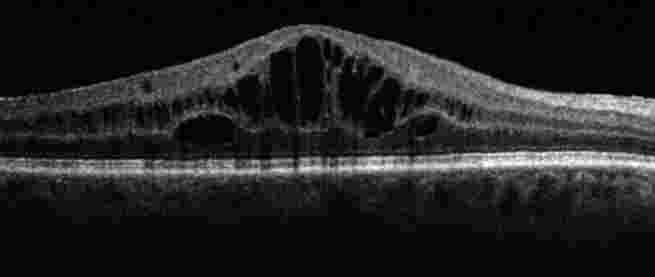Macular Edema
What is Macular Edema?
The macula is the part of the retina that helps us see fine detail, faraway objects, and color. Macular edema happens when abnormal fluid builds up in the macula, making it swell. It is typically caused by increased leakage from damaged retinal blood vessels or growth of abnormal blood vessels in the retina.
Symptoms of Macular Edema
It’s a painless condition and usually asymptomatic in the early stages. Patients may later develop
- Blurred or wavy central vision
- Colors may appear different
- May experience difficulty in reading

Causes of Macular Edema
- Diabetes: High blood sugar levels due to Diabetes causes leaky blood vessels at the macula.
- Age related Macular Degeneration:Here abnormal blood vessels leak fluid and cause macular swelling.
- Retinal Vein oclussions:When the veins in the retina become blocked,blood and fluid then leak out into the macula.
- Vitreomacular traction(VMT)
- Genetic/Hereditary disorders:such as Retinoschisis or Retinitis Pigmentosa.
- Inflammatory eye diseases: Conditions like uveitis, where the body attacks its own tissues, can damage retinal blood vessels and cause swelling of the macula.
- Medication: Certain drugs have side effects that can lead to macular edema.
- Eye Malignancies: Both benign and malignant tumors can lead to macular edema.
- Eye surgery. It’s not common, but sometimes after glaucome, retinal or cataract surgery, you can get macular edema.
Injuries. Trauma to the eye.
Cystoid Macular Edema
What is Cystoid Macular Edema? The macula is the part of the retina that helps us see fine detail, faraway…
Macular Edema Risk Factors
- Metabolic conditions (diabetes)
- Blood vessel diseases (vein occlusion/blockage)
- Aging (macular degeneration)
- Hereditary diseases (retinitis pigmentosa)
- Traction on the macula (macular hole, macular pucker, and vitreomacular traction)
- Inflammatory conditions (sarcoidosis, uveitis)
- Toxicity
- Neoplastic conditions (eye tumors)
- Trauma
- Surgical causes (following eye surgery)
- Unknown (idiopathic) causes
Macular Edema Prevention
Anyone with diabetes should have their eyes checked annually, at the least.
People with family history or underlying genetic condition can have a yearly eye examination.
Macular Edema Diagnosis
A routine dilated fundus examination by the ophthalmologist aids in the diagnosis. Further tests can be ordered to document and measure the thickness of the macula.
Optical Coherence Tomography (OCT): It scans the retina and provides very detailed images of its thickness. This helps your doctor find leakage and measure swelling of the macula. It can also be used to follow the response to treatment.
Fundus Fluorescein Angiography(FFA): For this test, fluorescein dye is injected into a peripheral vein in the hand or forearm. A series of photographs is taken of the retina as the dye passes through its blood vessels

Macular Edema Treatment
First and foremost is addressing the underlying cause of the macular edema, and the related leakage and retinal swelling.
Treatment can include:
Topical NSAIDS: Non Steroidal anti inflammatory drugs can be given as eye drops to cure the swelling.
Steroid treatment: When macular edema is caused by inflammation, steroids can be given either as drops,tablets or as injections into the eye.
Intravitreal injections: Anti Vascular Endothelial Growth Factor( Anti-VEGF)medicines given as intravitreal injections into the eye helps to reduce the growth of abnormal blood vessels in the retina, and also decreases leaking from blood vessels.
Laser treatment: With this tiny laser pulses are applied to the areas of fluid leakage around the macula. The goal is to stabilize vision by sealing off leaking blood vessels
Vitrectomy surgery: When macular edema is caused by vitreous pulling on the macula, a procedure called a vitrectomy may be needed to restore the macula to its normal (lying flat) shape.

Contact us
Bayya Hospitals
12-25-192, Bhagath Singh Centre, Kothapet, Guntur, Andhra Pradesh 522001
0863-2225729
+91 6304429294
+91 93819 22827
Useful Links
Consultation Hours
For ENT
Monday – Saturday 9AM – 1:30 Noon,
Evening 5:30PM to 8:00PM
Sunday – CLOSED
For EYE
Monday – Saturday 9AM – 5:00PM
Sunday – CLOSED